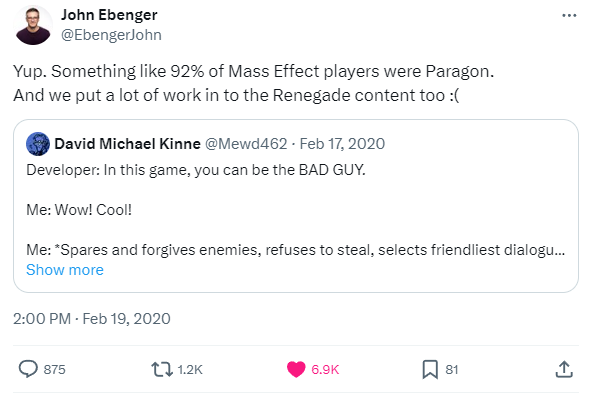The Value of Meaningful Stakes
My first dip into the Mass Effect franchise started with the second game (Mass Effect 2.) BioWare games are known for their robust, branching narratives where the characters, story, and world all change dramatically when you import a save file from the previous title. If you start from scratch like I did, however, you’re dropped into one of the worst possible timelines imaginable…
It was the single best introduction to a game you could ask for.
Commander Shepard was an unknown to me, at the time. Everything I knew about them came from interactions with other characters on the screen. “Who are these people, why do they respect me, and why am I held to such a high standard?” The more I played, the more I discovered my character, and the unknowing consequences of my actions from the previous game.
It made me want to change things, to learn more, and to make things right.
So, after finishing Mass Effect 2, I went on to play the original… and then play through the entire franchise multiple times after that. I was hooked.
In any of the subsequent playthroughs to follow, I had an incredibly difficult time forcing myself to make any evil or “renegade” decisions (to use terminology from the game.) It’s not in my nature, and based on 92% of players going the “paragon” route, I’d wager that it’s not in the nature of most humans.
Despite John’s sad-face tweet, adding those renegade options is an important foil that gave the paragon path more meaning. It meant being confronted with difficult decisions that butted up against our own ethics as human beings.
The in-game context, however, is such that you can still commit genocide and end up paragon... It’s not a binary decision, it’s a culmination of decisions you make throughout a game, even the no-win ones.
The meaning of our actions are driven by the weight of their consequences.
If I hadn’t started with Mass Effect 2, I’m sure I would have still had fun, and probably still be hooked. However, there’s no way I would have learned so much about what could go wrong, and the stakes were so much more meaningful to me because of it.
This is an important note when designing a game, because there are many ways to make a game fun without difficult decisions, but there are fewer ways to make players care about their choices.
At the same time, we shouldn’t confuse a decision’s cost for how meaningful it is.
For example: Which of these feel like a more meaningful decision to make in D&D?
Choosing to learn Fireball because other options aren’t as useful.
Choosing not to cast Fireball on a room full of bandits because one of them has a knife to a kid’s throat?
Both of these options have a cost, and each of them require you to make a choice, but I imagine (at least 92% of) you agree that option #2 seems more weighty.
Why is that?
Decisions feel more meaningful when the consequences of our actions ripple outward from our character. The further those ripples, the more meaningful the decision.
When you’re injecting a decision-point into a game, as yourself this question:
“Will it test a character’s relationship with the world?”
If the answer is likely to be “Yes,” then you’re on the right track.
Not every choice needs to determine which crewmember is left to die (and too many weighty decisions can make every effort feel futile,) but interspersing these moments of decision-making help keep a game fresh and your players connected to it.
-Wrel


